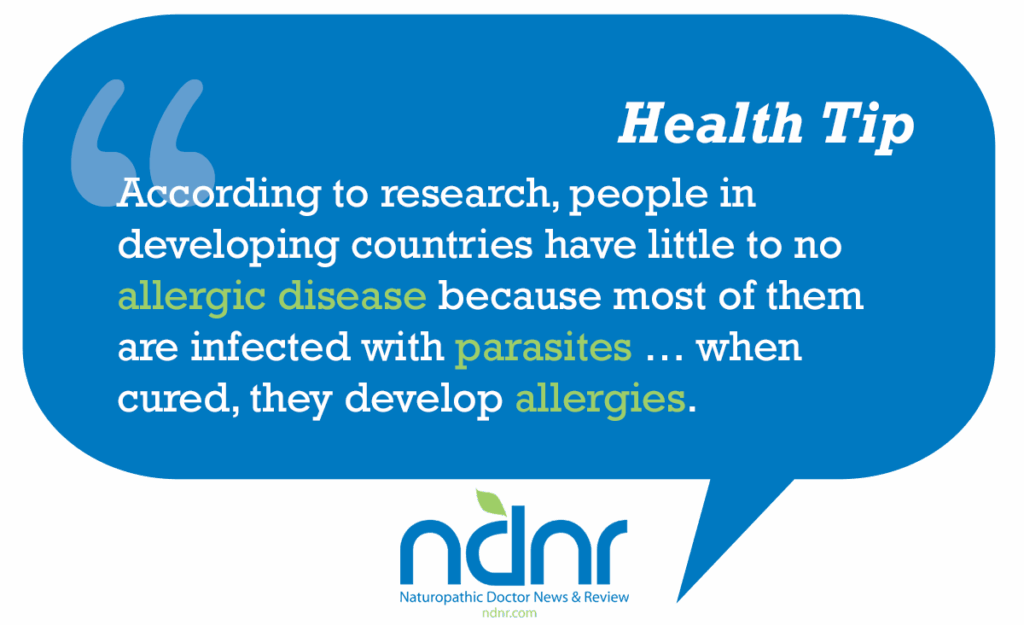Amy Elizabeth Terlisner, NMD
As NDs, we have all become familiar with the hygiene hypothesis. According to this theory, our children are being kept inside houses and schools sterilized by antibacterial cleaners; consequently, their immune systems have not gained the competency, or full range of exposures, needed to fully develop. Immunizations and frequent rounds of antibiotics also have left our children with immature immune systems. As a result, allergic disease and asthma have skyrocketed in industrialized nations.
This hypothesis inherently makes sense to naturopathic minds, but on reading about researcher Koichiro Fujita, I came across another explanation for our current rise in allergic diseases. Fujita, a professor at Tokyo Medical and Dental University, adds another factor to our increased risk of atopy in industrialized nations: lack of parasitic infection. According to his research, people in developing countries have little to no allergic disease because most of them are infected with parasites, particularly intestinal worms. When cured of their worms, they develop allergies. To prove his point, Dr. Fujita personally ate tapeworm eggs in hope of clearing his own allergies. He claims his tapeworm infection cured him of his severe hay fever, as well as lowered his cholesterol levels (Kobayashi, 2002).
 Cause of Allergy
Cause of Allergy
According to current theories, allergy is caused by an overactive Th-2 response and an underdeveloped Th-1 response. Remember that T helper cells play a central role in adaptive immunity. Once they have been activated by an antigen-presenting cell’s display of a pathogen, they are responsible for activating macrophages, B cells and T cells, and inducing B and T cell proliferation. In fact, without them there is no adaptive immune response.
Three classes of T helper cells exist: Th-1, Th-2 and T regulatory cells (formerly called T suppressor cells). Th-1 subclasses stimulate inflammation, activate macrophages and promote differentiation of cytotoxic T cells. The Th-2 subclass, however, promotes the migration of eosinophils, activates B cells and promotes antibody formation.
Before the advent of modern-day sanitation, newborns were subjected to multiple infections (viral and bacterial) that would stimulate proliferation of Th-1 cells and shift the balance away from Th-2 as their immune systems matured. Those children that survived grew up with a “well rounded” immune system. Going back to the hygiene hypothesis, our modern, “hyperclean” children are not exposed to the large numbers of pathogens and toxins that their predecessors were, so they retain an immune system with a strong Th-2 response and weak Th-1 response. As Th-2 cells remain overactive, their propensity to induce B cells to secrete excessive IgE amounts increases. This results in higher histamine release from mast cells, and the result is allergy. An overdeveloped Th-2 response is also one hypothesis for our current prevalence of autoimmune disease, as overall antibody production is increased in a Th-2 response as well.
Parasitic Infection and the Immune System
A quick tour on PubMed presents paper after paper stating that parasitic infection promotes a stronger Th-2 response (Shea-Donohue and Urban Jr., 2004). But wouldn’t we expect to see more allergy in individuals with intestinal parasites (i.e., in those who live in non-industrialized countries)? Why is it that empiric evidence proves the opposite? It turns out that worms actively suppress the immune system as well as cause the release of Interleukin-10 (IL-10) and transforming growth factor-b (TGF-b) (Shea-Donohue and Urban Jr., 2004). IL-10 has an overall suppressing function on the immune system, turning down both cellular and innate responses and inhibiting macrophages and dendritic cells. TGF-b has actions similar to IL-10.
If intestinal worms cause the release of IL-10 and a subsequent overall suppression of our immune system, could they not only provide relief from allergies, but also from autoimmune disease? Investigators are just now starting to research the link. In a 2007 study published in Annals of Neurology, researchers followed multiple sclerosis patients for 4.6 years who had intestinal parasitic infections vs. those that didn’t. They found that those infected showed a significantly lower number of exacerbations, minimal variation in disability scores, as well as fewer magnetic resonance imaging changes when compared with uninfected MS patients. These researchers found higher amounts of IL-10 and TGF-b in the blood of those with parasitic infections and drew the conclusion that parasitic infections may induce T-regulator cells (suppressor cells) through these cytokines (Correale and Farez, 2007).
In a study printed in the April 2007 Journal of Immunology, researchers showed that mice infected with Schistosoma mansoni were less susceptible to colitis induced by dextran sodium sulfate (a model for inducing IBD in mice studies). They proposed that macrophages inherent in the parasitic infection proved protective. After injecting non-infected mice with the macrophages generated in the colonic lamina propria of infected mice, significant resistance was transferred. They proposed that many other mechanisms besides induction of IL-10 play a part in decreasing allergic disease in parasite infected organisms (Smith et al., 2007).
Researchers are now looking at ways to purify the stimulatory proteins found in these parasites in order to suppress our immune systems from allergies, asthma and autoimmune disease. Perhaps we need to expand our thinking as NDs in thinking that all parasitic infections are bad for the body. Should we discontinue rounds of Artemisia annua and other antiparasitic protocols? We lived for tens of thousands of years in a symbiotic relationship with these organisms, and perhaps something beneficial came out of that relationship. As research continues, I think we will begin to see a difference in pathology regarding different kinds of parasitic infections (malaria vs. tapeworms vs. Echinococcus). We also clearly need to rethink our obsession with cleanliness in order to provide better health for future generations. As far as recommending that my allergy-ridden patients ingest parasitic worms, however … I’m not sure I can stomach the idea yet.
 Amy Elizabeth Terlisner, NMD attended Bastyr University. She has an extensive teaching background, which she believes is an important element in naturopathic medicine. She currently teaches pharmacognosy to doctoral students at Emperor’s College of Traditional Oriental Medicine in Santa Monica, Calif. Her specialties include women’s health, cardiovascular disease, gastroenterology, preventive/anti-aging medicine and bioidentical hormone replacement therapy.
Amy Elizabeth Terlisner, NMD attended Bastyr University. She has an extensive teaching background, which she believes is an important element in naturopathic medicine. She currently teaches pharmacognosy to doctoral students at Emperor’s College of Traditional Oriental Medicine in Santa Monica, Calif. Her specialties include women’s health, cardiovascular disease, gastroenterology, preventive/anti-aging medicine and bioidentical hormone replacement therapy.
References
Kobayashi T: Excessive cleanliness makes you sick (review of Fujita, K: Kiseichu-ha-tsurai-yo “It’s Hard for a Parasitic Worm”), Japan Today Apr14, 2002. Web site: www.japantoday.com/jp/book/111
Shea-Donohue T, Urban JF Jr: Gastrointestinal parasite and host interactions, Curr Opin Gastroenterol Jan; 20(1):3-9, 2004.
Correale J, Farez M: Association between parasite infection and immune responses in multiple sclerosis, Ann Neurol Feb; 61(2):97-108, 2007.
Smith P et al: Infection with a helminth parasite prevents experimental colitis via a macrophage-mediated mechanism, J Immunol Apr 1; 178(7):4557-66, 2007.


